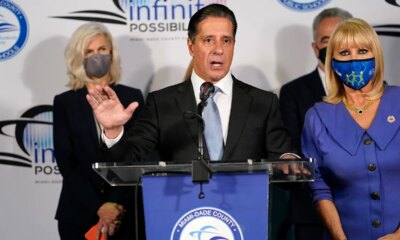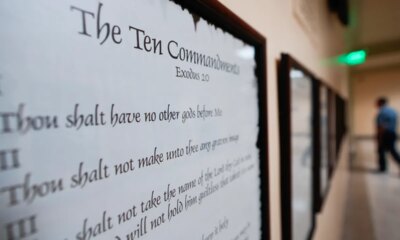Texas
Is banning DEI in college courses the next step for Texas?

Texas lawmakers are eyeing how DEI is woven into college courses and how much influence faculty senates have on campuses.
A group of senators met on Monday to debate two issues that are some of Lt. Gov. Dan Patrick’s legislative properties for next year’s session.
Patrick wants legislators to review the role of faculty senates and enforce Texas’ ban on diversity, equity and inclusion programs at state colleges and universities.
The DEI ban, which passed last year, has exceptions for research and course instruction. However, during Monday’s hearing, lawmakers suggested that instruction might be targeted next.
“While DEI-related curriculum and course content does not explicitly violate the letter of the law, it indeed contradicts its spirit,” said Sen. Brandon Creighton, R-Conroe, who authored the DEI ban and oversees the Senate higher education subcommittee.
Sen. Royce West, D-Dallas, who opposes the DEI ban, said as colleges have reviewed programs, they have “revealed no so-called smoking gun, proving that DEI is racist or exclusionary as some of my colleagues continue to suggest.”
West emphasized that while many associate DEI with race, DEI programs eliminated to comply with the new law included those for veterans and various faculty support groups.
He questioned Texas A&M University President Mark Welsh III on academic minors that were cut last week, including one for LGBTQ studies.
The Dallas senator asked whether political motivation was behind the decision to cut that specific minor. Welsh denied any.
A&M faculty members have complained about the way university officials cut these programs without consulting them. Welsh agreed that faculty was not “sufficiently” involved in that decision but will participate moving forward.
Creighton said he received multiple reports about college courses that have DEI content woven in across various fields of study. The subcommittee’s goal is to examine programs and certificates that “perpetuate any discriminatory efforts within diversity, equity and inclusion,” he said.
Courses that have such lessons in them do not “reflect the expectations of Texas taxpayers and students who fund our public universities,” Creighton said.
Much of the day’s focus explored how the politics of faculty senate members potentially play a role in what’s taught on campuses.
He asked repeatedly whether political interference from faculty members influence decisions and votes for the approval of programs.
Jay Hartzell, president of the University of Texas at Austin, stressed that new courses are implemented based on market demand.
Holley Love, faculty senate president at the University of Houston, said faculty’s political leanings do not impact decisions on what’s taught. Creighton pressed asking if she has seen any example of faculty developing curriculum based on political leanings. She said no.
During public testimony, dozens spoke in support of DEI and faculty senates. Most were current and former students of Texas colleges, as well as professors.
Many asked lawmakers to reverse the state law that now prevents public colleges and universities from having DEI offices and programs that are specific to certain races or genders, arguing DEI creates an inclusive environment for students who historically were excluded from higher education.
Critics of DEI say DEI favors race or gender over merit and stifles freedom of speech by compelling people to believe in the same belief system.
Invited panelists who oppose how DEI is included in various college courses included Sherry Sylvester of the Texas Public Policy Foundation and Nick Down of the American Council of Trustees and Alumni.
Sylvester said the culture on Texas campuses “revolve around identity politics, gender and race theory and a bedrock belief that America’s built and maintained on systemic racism, oppression and privilege.”
It’s critical that the subcommittee look into what’s being taught in university classrooms, Sylvester added.
The DEI ban was passed last legislative session and went into effect Jan. 1 and has impacted DEI offices, LGBTQ centers, scholarships, programs for immigrant students and others.
The group of senators will “review how these programs and their curricula are misaligned with the workforce demands of our state and recommend reforms to ensure that universities are educating students in ways that meet current Texas workforce needs,” Creighton said.
The DMN Education Lab deepens the coverage and conversation about urgent education issues critical to the future of North Texas.
The DMN Education Lab is a community-funded journalism initiative, with support from Bobby and Lottye Lyle, Communities Foundation of Texas, The Dallas Foundation, Dallas Regional Chamber, Deedie Rose, Garrett and Cecilia Boone, The Meadows Foundation, The Murrell Foundation, Solutions Journalism Network, Southern Methodist University, Sydney Smith Hicks and the University of Texas at Dallas. The Dallas Morning News retains full editorial control of the Education Lab’s journalism.

Texas
St. Andrew’s Prom Closet helps North Texas teens shine without the high cost

It’s that time of year again – prom season. For many students, it’s a night to remember, but between dresses and other expenses, the costs can add up quickly. Every year, St. Andrew’s Methodist Church steps up to help ease the financial burden for families, offering free prom dresses and accessories to young women.
“I’m feeling very excited, very happy, you know it’s all like coming to me at once,” said Gabrielle Bennett, a high school junior.
Prom season is a moment many young girls look forward to, and finding the perfect dress.
Boutique experience for every shopper
“It was a lot of searching through a lot of dresses.. and seeing what fits, what doesn’t, what looks nice, and then you finally find one, and it fits perfect,” said Ally Atkins, a high school senior.
For 17 years, St. Andrew’s Methodist Church has opened its prom closet to girls across North Texas, helping those who may not be able to afford the high cost of prom. This year, organizers hope to serve 1,400 shoppers. There are more than 5,000 dresses to choose from in different colors, styles, and sizes.
“Every young lady should feel special at prom. Every young lady deserves to be beautiful, and in some cases, some of these young ladies, this would not be possible,” said Kathy Moore, a Prom Closet chairman.
Community donations make it possible
The experience is designed to feel like a real boutique – from trying on dresses to grabbing the perfect shoes, bag, and accessories. Everything is donated.
“I had one yesterday that walked into our dress area, and she stopped and just said, ‘wow,’ and so right there, that moment, that’s why we do it,” Moore said.
Organizers said the event is made possible by community donations and dozens of volunteers, but they’re always looking for more help. Next year, they hope to serve even more girls, continuing their mission to make more prom dreams come true.
“I want to thank this whole organization, I’m very grateful,” Bennett said.
How to participate
If you know someone who may need a prom dress this season, the Prom Closet is open until March 7. It is by appointment only. For more information, visit: https://standrewmethodist.org/prom-closet/
Texas
U.S. and Israel carry out joint military strikes against Iran
Texas
Texas to require proof of identity, legal status for new vehicle titles March 5, 2026

EL PASO, TEXAS (KFOX14/CBS4) — A major change is coming to how vehicles are titled and registered in Texas, with local officials and border-area dealerships bracing for questions, delays and the possibility that some buyers could take their business out of state.
Beginning March 5, 2026, Texans applying for an original vehicle title and registration will need proof of identity and proof of legal status in the United States.
The Texas Motor Vehicle Board approved a new rule requiring county tax offices to verify that documentation before processing those transactions.
“If the person doesn’t have valid ID, we cannot register their vehicle,” said Ruben Gonzalez, the El Paso County tax assessor-collector.
Gonzalez said the rule is mandatory statewide and is not a local policy, but a state mandate he is required to follow as an agent of the DMV.
Under the rule, buyers must present a REAL ID-compliant Texas ID or other federally recognized documents, including a passport or permanent resident card.
Gonzalez said the rule takes effect March 5 for new titles and registrations, but proof of legal status for registration renewals will not be required until Jan. 1, 2027.
“We’re going to give a year’s time for those people to qualify, but more so to allow the entities, businesses like lean holders and dealers and the county offices to be trained on what’s an acceptable form of documentation to accept from people that are renewing online or in our offices,” Gonzalez said.
Destiny Venecia reports on Texas to require proof of identity and legal status for vehicle titles, registrations (Credit: KFOX14)
RECOMMENDED: El Paso residents report natural gas bills nearly doubling, citing surprising fees
Local dealerships said they are working to adapt, but some employees and customers are uneasy about the change.
Luis Fierro, president of the El Paso Hispanic Independent Automobile Dealer Association, said, “My personnel is a little bit scared to make a mistake. Within the dinner community, they’re all scared, they’re all lost in the system. They’re trying to figure out, as we all believe, an ID was a real ID. Now we find out that what we knew that was good to be used is no longer good.”
Border-area dealerships also worry customers could buy and register vehicles in New Mexico, taking taxes and fees out of Texas.
“Customers are scared of the new implementation, that they’re going to take their business to New Mexico, pay their taxes in New Mexico, and handle the registration and renewals in the state of New Mexico and avoid Texas,” Fierro said.
County leaders said the concern extends beyond lost sales to lost revenue for Texas counties.
“It’s going to be a loss of revenue because if they go to New Mexico, we can’t collect our fees that are due because they’re all they’re running using our highways,” Gonzalez said.
County officials said they expect an increase in questions and possible delays in the first few months after the rule takes effect March 5, 2026.
RECOMMENDED: Texas bans temporary paper license plates to curb fraud
Sign up to receive the top interesting stories from in and around our community once daily in your inbox.
-

 World3 days ago
World3 days agoExclusive: DeepSeek withholds latest AI model from US chipmakers including Nvidia, sources say
-

 Massachusetts4 days ago
Massachusetts4 days agoMother and daughter injured in Taunton house explosion
-

 Montana1 week ago
Montana1 week ago2026 MHSA Montana Wrestling State Championship Brackets And Results – FloWrestling
-

 Louisiana6 days ago
Louisiana6 days agoWildfire near Gum Swamp Road in Livingston Parish now under control; more than 200 acres burned
-

 Denver, CO3 days ago
Denver, CO3 days ago10 acres charred, 5 injured in Thornton grass fire, evacuation orders lifted
-

 Technology1 week ago
Technology1 week agoYouTube TV billing scam emails are hitting inboxes
-

 Technology1 week ago
Technology1 week agoStellantis is in a crisis of its own making
-

 Politics1 week ago
Politics1 week agoOpenAI didn’t contact police despite employees flagging mass shooter’s concerning chatbot interactions: REPORT


























